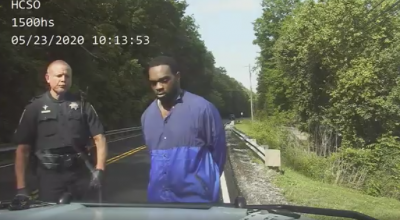

The state supreme court on Thursday issued an order “requiring all persons entering a courthouse for the purpose of court-related business to wear a face covering over the nose and mouth. The face covering shall be worn at all times while in the building.”
By David Tulis / NoogaRadio 92.7 FM
Chief justice Jeff Bivens issued a first “executive order” of a “judicial emergency” March 13. “The emergency has been extended multiple times through additional orders,” according to a statement from Nashville. “The May 26 Order eased restrictions on in-person hearings, allowed for jury trials to begin after July 3, and allowed judicial districts to continue to operate under their approved plans.
“Today’s order does not change those provisions and only adds a state-wide face covering requirement. The face covering requirement is effective Monday, July 13.
“The recent uptick in Covid-19 cases, hospitalizations, and deaths required the court to reconsider how to best keep the public, court staff, and judiciary safe while keeping courts as open and accessible as possible,” Judge Bivens said.
“The face covering requirement is consistent with directives from the Centers for Disease Control, the Tennessee Department of Health, and several Tennessee county mayors. The order provides several exceptions, including for those under age 12 and individuals with a bona fide medical reason.”
Judicial hypocrisy
The courts have trapped members of the public, those of the jury pool, behind the administrative mask rule. In other words, jurors are compelled to wear chin diapers. It remains to be seen how many refuse to wear the masks, which no one has legal authority to impose on any person not proveably sick.
“The Court indicated in that order that jurors should be required to wear face coverings. In light of the continued spread of COVID-19 and the recommendations of federal and state authorities with respect to the use of face coverings, and under the constitutional, statutory, and inherent authority of the Tennessee Supreme Court, the Court now further orders the mandatory use of face coverings.”
The court system makes show of caring about open court.
“The courts of Tennessee remain open, consistent with the Judicial Branch’s obligation to mitigate the risks associated with COVID-19.” The problem for constitutional rights is that the courts remaining open is not “consistent” with judges alleged “obligation to mitigate the risks” of CV-19.
Notice that the duty of consistency is upon the idea of open court, not the other way around. The leading paradigm is CV-19, not open court, and the open court promise is made consistent with that. The two are incompatible, and across the state courts are locked, families and supporters wait outside in cars with no restroom facilities, no shade and no grace.
Defense of open courts
The supreme court at Richmond Newspapers Inc. v Virginia, 100 S.Ct. 2814, 1980, highlights the necessity of open court and their role in defending liberty. Notice all the essential elements of a free society are upheld in courts being 100 percent open to all members of the public at any time, without license or precondition.
The historical evidence of the evolution of the criminal trial in Anglo-American justice demonstrates conclusively that at the time this Nation’s organic laws were adopted, criminal trials both here and in England had long been presumptively open, thus giving assurance that the proceedings were conducted fairly to all concerned and discouraging perjury, the misconduct of participants, or decisions based on secret bias or partiality. In addition, the significant community therapeutic value of public trials was recognized: when a shocking crime occurs, a community reaction of outrage and public protest often follows, and thereafter the open processes of justice serve an important prophylactic purpose, providing an outlet for community concern, hostility, and emotion. To work effectively, it is important that society’s criminal process “satisfy the appearance of justice,” Offutt v. United States, 348 U.S. 11, 14, 75 S.Ct. 11, 13, 99 L.Ed. 11 which can best be provided by allowing people to observe such process. From this unbroken, uncontradicted history, supported by reasons as valid today as in centuries past, it must be concluded that a presumption of openness inheres **2817 in the very nature of a criminal trial under this Nation’s system of justice. Cf., e. g., Levine v. United States, 362 U.S. 610, 80 S.Ct. 1038, 4 L.Ed.2d 989. Pp. 2821–2827.
*** The freedoms of speech, press, and assembly, expressly guaranteed by the First Amendment, share a common core purpose of assuring freedom of communication on matters relating to the functioning of government. In guaranteeing freedoms such as those of speech and press, the First Amendment can be read as protecting the right of everyone to attend trials so as to give meaning to those explicit guarantees; the First Amendment right to receive information and ideas means, in the context of trials, that the guarantees of speech and press, standing alone, prohibit government from summarily closing courtroom doors which had long been open to the public at the time the First Amendment was adopted.
Moreover, the right of assembly is also relevant, having been regarded not only as an independent right but also as a catalyst to augment the free exercise of the other First Amendment rights with which it was deliberately linked by the draftsmen. A trial courtroom is a public place where the people generally — and representatives of the media—have a right to be present, and where their presence historically has been thought to enhance the integrity and quality of what takes place. Pp. 2827–2828.
*** Even though the Constitution contains no provision which by its terms guarantees to the public the right to attend criminal trials, various fundamental rights, not expressly guaranteed, have been recognized as indispensable to the enjoyment of enumerated rights. The right to attend criminal trials is implicit in the guarantees of the First Amendments *557 without the freedom to attend such trials, which people have exercised for centuries, important aspects of freedom of speech and of the press could be eviscerated. Pp. 2828–2829.


